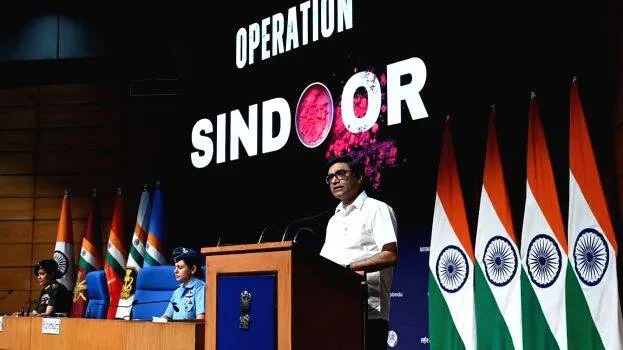

India has firmly and effectively responded to the barbaric terrorist attack in Pahalgam that claimed the lives of 26 civilians. Most of the victims were newlyweds and husbands of women belonging to the Hindu community. It is part of the Hindu tradition for women to smear red vermillion 'Sindoor' on their forehead after marriage. Symbolically, the army carried out the retaliation in the wee hours of Tuesday night and termed it ‘Operation Sindoor’, to bring justice to the widows of all the victims in Pahalgam, who had to wipe away the vermillion powder from their foreheads.
The Indian Army carried out missile strikes on nine terror camps in Pakistan and Pakistan-occupied Kashmir early yesterday morning. The response was controlled and precise. It was a message to the whole world from India that retaliation is a surety for carrying out barbaric crimes on Indian soil. By excluding populated areas from the attack, India went for precision attack baring Pakistan civilians from the atrocities.
Five terror camps in Pakistan-occupied Kashmir and four in Pakistan were destroyed. Pakistan's airspace was not violated, unlike the Balakot attack in 2019. The four terror camps across the Line of Control were selected as targets.
The most significant of these was the attack on Bahawalpur, a city on the edge of the Thar Desert in Pakistan's Punjab province, which is a stronghold of the terrorist organization Jaish-e-Mohammed.
It is also the birthplace of Jaish-e-Mohammed terrorist group chief Masood Azhar. The Indian Army also destroyed terrorist camps in places like Kotli, Muzaffarabad, Muridke, Bahawalpur, Sialkot, and Barnal. All nine of these centres have links to terrorist attacks and infiltration attempts targeting India. In that sense, the retaliation also aimed at settling some old scores. The terror camp led by Lashkar-e-Taiba was destroyed in Muridke. The 82-acre terror camp in Muridke has facilities such as training areas and launch pads.
India had previously stated that Lashkar-e-Taiba was behind the 2008 Mumbai attacks. The terrorists who carried out the 26/11 Mumbai attacks were trained at this camp.
The camp in Sialkot was operated by the terrorist organization Hizbul Mujahideen. The camp in Barnal was used to train Lashkar-e-Taiba terrorists for infiltration across the border. Terrorists from the camp in Muzaffarabad were mainly active in the attacks in Sonmarg, Gulmarg and Pahalgam in Kashmir.
This was the first time since 1971 that India's army, navy, and air forces had jointly invaded Pakistan-occupied Kashmir and carried out a counterattack. The main targets of India's counterattack were the terrorist organizations Lashkar-e-Taiba and Jaish-e-Mohammed. The Indian army destroyed terrorist centres that had been cultivated over the past three centuries with the help of Pakistan's spy agency, ISI, and the Pakistani army.
This military counterattack, codenamed 'Operation Sindoor', was meticulously conducted based on accurate intelligence. Initial reports indicate that weapons that could avoid widespread damage were chosen for the attack, to not cause harm to ordinary citizens.
The attack on Indian tourists by Pakistan-sponsored terrorists was an attack on India itself. One of their goals was to destroy communal harmony in India by targeting and killing only Hindus. India’s foreign secretary added that India retaliated because of Pakistan's inefficiency in taking any action against the terrorists even after 14 days of the terrorist attack.
Two days before the retaliatory strike, Prime Minister Narendra Modi had met with the chiefs of the Army, Navy and Air Force. In this meeting, the Prime Minister gave the armed forces full authority to decide the time and location to retaliate. Indian National Security Advisor Ajit Doval is leading the Indian efforts. India has informed Russia, Saudi Arabia, the UAE, and the UK of its retaliation, in addition to the US.
It is also noteworthy that two female military officers were assigned to officially share the details of "Operation Sindoor" with the media on Wednesday morning. This is also a time of crisis when the Indian people must stand united and not fall for false stories on social media. In any case, the coming days are very crucial.